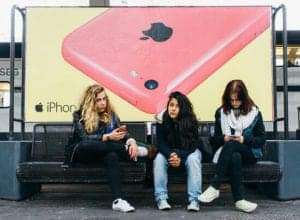Social media is meant to be a way to connect with others, but what happens when its effects are anything but social?
A study conducted by researchers from the University of Pittsburgh looked at media usage and its association with perceived social isolation (PSI). Almost 1,800 young adults ranging in age from 19 to 32 years old participated in the study.

While social media in itself is designed to connect with others, the feeling after using a social media platform is often the opposite. Those who used social media for more than two hours a day doubled the odds for increased PSI versus those who used social media for less than 30 minutes per day.
Other factors that determined whether an individual felt a high level of PSI included marital status and yearly household income. Married participants had lower odds of having higher PSI, while those who earned less than $30,000 a year had higher odds of having higher PSI.
Based on the data from the study alone, a direct cause for PSI is hard to determine, the authors said. Study co-author Brian Primack found the results surprising, but said that people can feel as if they’re missing out while scrolling through images of their friends’ homes, vacations, etc.
Related: Social Media Could Be Sabotaging Your Sex Life
“You might watch all these interactions where it seems like everyone else is connecting,” Primack said to NPR.
Connections could look like they’re being made, but there’s a lot more happening beneath the surface, the authors wrote. They said that increased time using social media could displace authentic social experiences that could actually decrease any feelings of social isolation.

Another possibility could be that the online environment facilitates feelings of being left out. Or, social media could give a distorted view of reality that promotes feelings of envy. Social isolation can be felt due to any of these factors, even from arguments online or being “unfriended,” which can feel isolating, the authors said.
The study relied on self-reported survey answers from participants, who answered questions about their feelings of isolation while using social media. Social media use was assessed using both time and frequency for 11 platforms, including Facebook, Twitter, Instagram and Snapchat.
Related: Are You a Facebook Fanatic? It Might Be in Your Genes
Holly Shakya, an assistant professor in the division of Global Public Health at the University of California in San Diego, said the study sheds light on social media behaviors and how it can affect its users. Shakya was not involved with the study.

“What we know at this point is that we have evidence that replacing your real-world relationships with social media use is detrimental to your well-being,” Shakya said. “But we need further research to tease out the mechanisms and replicate the findings.”
Ultimately, those who have a high use of social media have the tendency to feel more socially isolated than their peers who use social media less, the authors said. More importantly, social isolation leads to significant health issues, such as increased morbidity and mortality.
“Social isolation … can disrupt sleep, immune function, and cognition,” the authors wrote. “Social isolation also affects gene expression, negatively impacting vascular and mental health. It is not surprising that social isolation can substantially increase the risk for all-cause mortality.”
Tori Linville is a freelance writer and editor from Clarksville, Tennessee. When she isn’t writing or teaching, she’s faithfully watching her alma mater, the University of Alabama, dominate the football field.


![How To: ‘Fix’ Crepey Skin [Watch]](https://cdn.vitalupdates.com/wp-content/uploads/2017/05/bhmdad.png)












